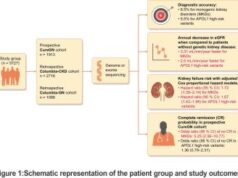Health professionals have disclosed that women who frequently undergo spontaneous abortion or miscarriage risk having premature mortality, particularly death from cardiovascular disease.
A professor of Obstetrics and Gynaecology and Chief Medical Director at the Lagos State University Teaching Hospital, Adetokunbo Fabamwo disclosed that miscarriage reflects a woman’s overall health in a way.
“But the issue about miscarriage is that you need to know what kind of miscarriage we are talking about — there are early miscarriage and late miscarriage.
“Early miscarriage happens in the first three months of pregnancy; late miscarriage would occur at about the fourth and fifth month and after that, if pregnancy is terminated prematurely, it will be regarded as a late miscarriage,” Fabamwo explained.
The CMD also stated that the timeline for deciding pregnancy loss varies from country to country.
“In the United States, it is 20 weeks; in the UK, it’s about 22-24 weeks; but in Nigeria, it is 28 weeks.
“So, any pregnancy that is terminated below 28 weeks in Nigeria is regarded as abortion. Between 28 weeks and 37 weeks, any pregnancy that is delivered is regarded as premature,” he added.
Fabanwo said that early miscarriage is usually in the first three months and it may determine the woman’s overall health because certain medical conditions predispose to early miscarriage.
“Such conditions include diabetes mellitus and high blood pressure, “but majorly, the reasons for early miscarriage are foetuses that have abnormal component, so you have genetic abnormalities — foetuses that are abnormally formed are the ones that are usually rejected from the body in the first three months,” Fabamwo enthused.
Continuing, he said, “Between three to five months, miscarriages are usually due to a defective cervix which is the neck of the womb. The cervix is supposed to be firm and be able to sustain the pregnancy until the baby is ready to be delivered.
“However, in some cases, due to congenital abnormalities due to injury to the cervix, due to previous deliveries, due to repeated abortions, the cervix may be incompetent. So, it’s unable to carry the load of a pregnancy and it just gives way and there is a miscarriage.
“So, a miscarriage can be a reflection of the overall health of the woman.”
He advised women who have had a miscarriage to be screened for many things, noting, however, that heart disease is not a major factor in causing miscarriages. “So, it may not be time well-spent screening a woman for heart diseases.
“Rather, women should be screened for certain viral diseases, genetic studies can be done, you can screen for diabetes mellitus, you can determine the genotype, the blood group because certain incompatibility in genotype and blood group can cause miscarriages,” Fabamwo said.
In terms of reasons for repeated miscarriages, the physician said, “Some women have certain genetic incompatibilities between themselves and their husbands and, for as long as they continue to make babies, these abnormalities will be reflected in the formation of the foetus, and there will be a miscarriage.
“Some women have diabetes mellitus who do not treat it and for as long as the disease persists and they keep getting pregnant, they will have miscarriages.
“For those women who have an incompetent cervix, unless they see specialists who, at a certain period during the pregnancy will tie the neck of the womb such that it doesn’t open up when pregnancy advances, they will keep on having recurrent miscarriages.
“For women who have fibroids in their wombs and don’t have them removed, when the pregnancy reaches a certain stage, the fibroid will push the baby out and until the fibroids are removed, the pregnancy experience will continue to be the same.”
Another Senior Obstetrician and Gynaecologist at the Federal Medical Centre, Ebute-Metta, Dr. James Taiwo Odofin also disclosed that there is no way a miscarriage would not affect a woman psychologically.
He said that most early miscarriages are due to genetic abnormalities — it is the genetic makeup of the couple.
“Other causes of miscarriage are trauma, drugs, infection in pregnancy, and cervical incompetence.
“If the cervix is not competent to hold the pregnancy, at a particular gestational age, from 40 weeks and above, the pregnancy can come down and antiphospholipid syndrome (an autoimmune disorder that is associated with pregnancy complications) can set in,” Odofin said.
He also stated that heart disease does not cause miscarriage, “so you don’t need to screen women who have had a miscarriage for heart disease.
“However, some medical conditions can lead to miscarriage. These are uncontrolled diabetes mellitus, uncontrolled hypertension and it does not mean that someone with diabetes or hypertension will have a miscarriage but the conditions have to be controlled.”
He stressed that cervical incompetence, congenital uterine anomalies, and antiphospholipid syndrome are the likely reasons for multiple miscarriages among some women.
“Meanwhile, if the miscarriage is due to congenital uterine anomalies, the person needs to be investigated; and for cervical incompetence, the mouth of the womb can be tied at a particular time of the pregnancy.
“For antiphospholipid syndrome, some treatment can be given to the woman and the woman needs to see a gynaecologist for appropriate treatment,” Odofin counselled.











